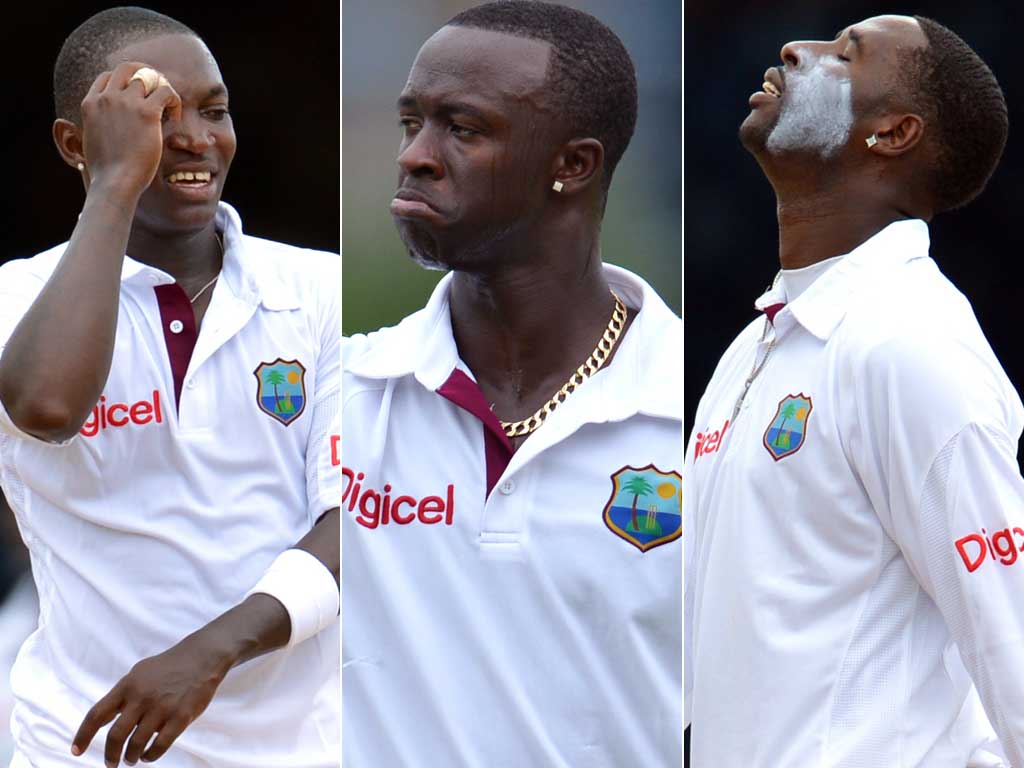Chaos and crisis in Caribbean
As they arrive for the Tests against England, West Indies are average on the field and a shambles off it. Stephen Brenkley reports

West Indies arrived yesterday. They were utterly unheralded where once they would have been feted and feared in equal measure. Their formal unveiling as the first tourists of the summer will take place in Hove this afternoon, though the most excited response will barely rise above a shrug of the shoulders.
Cricket in the Caribbean, once so joyous and victorious, is in an unholy mess. It is not simply that the team are losing too often but that the game is being so woefully run that there is a serious danger of the world passing it by.
The recent domestic first-class cricket competition was an embarrassment and a shambles. It lacked both a sponsor and quality, with match after match being done and dusted in three days.
There is talk of secession in the air and going it alone, whether it be in Jamaica, or Trinidad, or Guyana. Talk is one thing, action another and a split by one or more seems unlikely, if for no other reason than it would leave any breakaway country without international cricket for at least a generation, while it regrouped and sought full membership of the ICC.
Throughout the region the game in the individual countries which make up the West Indies Cricket Board is in turmoil. Government intervention in Guyana, supported by the former West Indies captain Clive Lloyd, has brought virtual meltdown and court action yet to be resolved. In Jamaica, the Prime Minister, the highly regarded Portia Simpson Miller, became involved in a testy exchange with the not so highly regarded WICB.
In Trinidad, there has been a rapprochement recently between the board and the country's government but there are still bitter disputes between opposing factions in the game which threaten to undermine progress. The Windward and Leeward islands seem to be in worse disarray, with no elections having been held for five years and no annual reports made either to the central governing body. Antigua, in the Windwards, was where so many great players – Viv Richards, Andy Roberts, Curtly Ambrose – came from. Were it not for it being the headquarters of the WICB it would now be a cricketing backwater. The WICB has made several misjudgements. Chief among them was commissioning an inquiry by B J Patterson, a former Prime Minister of Jamaica, who made a series of recommendations about the future direction of a game in a thorough, wide-ranging report. None has been implemented.
If everyone agrees that the present system is unsustainable, no one agrees how it can be changed.
Meanwhile, the team struggle on. For much of the past decade the players have been in conflict with the board and Chris Gayle, the former captain (left), has not played international cricket for more than a year. Although there are signs of more friendly relations generally, the way ahead is fraught.
Too many players are being lost too often to Twenty20 competitions around the world, for the board is perpetually cash-strapped, having scant television income. Gayle apart, Dwayne Bravo, Andre Russell and Sunil Narine are plying their trade in the IPL when they should be in England.
It is widely expected that they will lose the three-Test series (probably 3-0). The squad of 15 is far from hopeless. It contains players of genuine talent, five of them no older than 23. It also possesses, in the 37-year-old Shivnarine Chanderpaul, the batsman who is officially the world's best. Chanderpaul returned to top place in the ICC rankings with his stoic displays in the recent home series against Australia.
But as a whole they lack nous. Too often they have failed to last the distance in Test matches, putting themselves in positions of control which have been too easily wrested from them. Many of their players, especially but not exclusively the batsmen, look ill-equipped for the peculiar, stringent demands of long-form cricket.
It cannot be easily rectified, although Ottis Gibson, the coach, who was formerly England's fast-bowling coach, has introduced more discipline. He has also been loyal to his preferred captain, Darren Sammy, which may prove costly. Sammy is a resolute character but his ability at the highest level is in doubt.
Anyway, whatever West Indies do in England, there is one certainty: the game is in peril at home.
Subscribe to Independent Premium to bookmark this article
Want to bookmark your favourite articles and stories to read or reference later? Start your Independent Premium subscription today.

Join our commenting forum
Join thought-provoking conversations, follow other Independent readers and see their replies